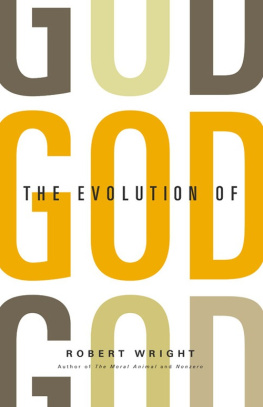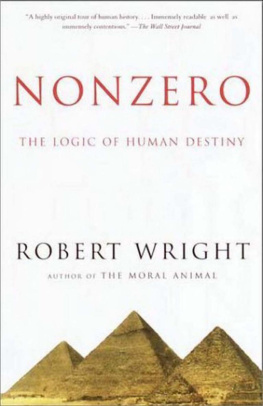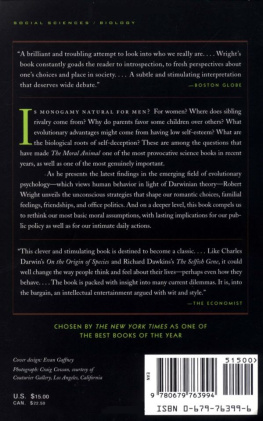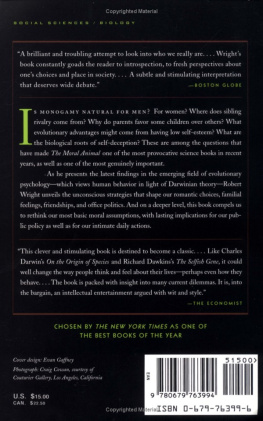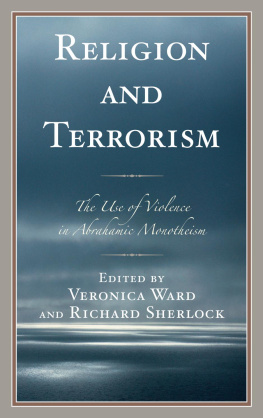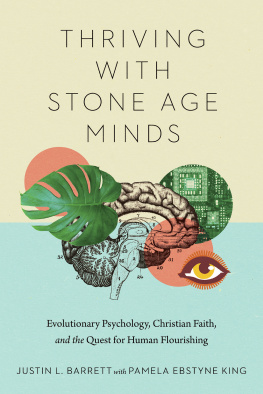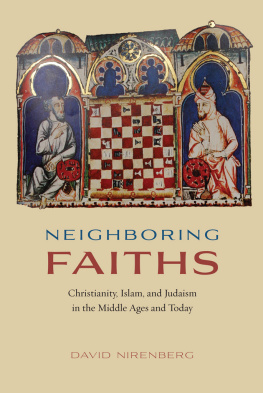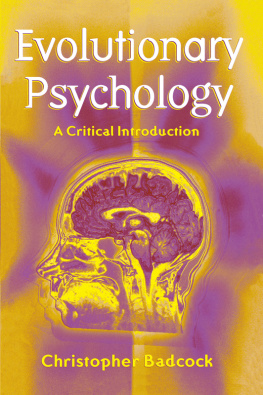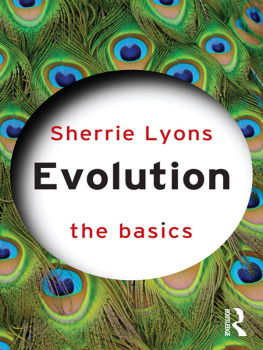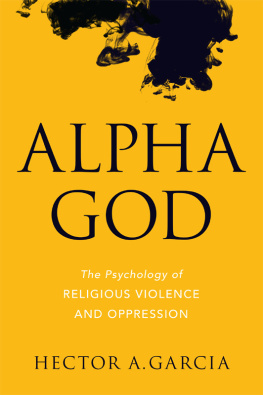
I owe a debt to two great institutions of higher learning: Princeton University and the University of Pennsylvania. At Penn, through the good offices of Dean Sam Preston, I was allowed to teach two courses that informed this book: a graduate seminar called Religion and Human Nature (which, as it happens, was scheduled to commence on September 11, 2001), and an undergraduate lecture course called The Evolution of Religion. Theres no education like teaching a course for the first time, and I thank my students for enduring my learning.
At Princeton I was privileged to be a Laurence S. Rockefeller Visiting Fellow at the Center for Human Values in 20042005. This gave me the time and resources to focus single-mindedly on this project, and weekly seminars, led by Steve Macedo, were valuableespecially the one devoted to critiquing ideas central to this book. Two years later at Princeton, I benefited from co-teaching a graduate seminar with Peter Singer on the biological basis of moral intuition.
The Center for Human Values also brought me two bona fide godsendsgraduate students who became invaluable research assistants: Kevin Osterloh, whose fluency in Hebrew and conversancy in the Hebrew Bible helped guide me through largely unfamiliar terrain; and Mairaj Syed, whose fluency in Arabic and conversancy in Islamic scripture had exactly analogous value. Plus, both of them are great human beings.
In Princeton I also encountered several scholars who did me the service of reading and critiquing chapters in draft: John Gager and Michael Cook at the university; and Patrick Miller and Shane Berg at Princeton Theological Seminary. Also reading chapters in draft were Mark S. Smith, Marvin Sweeney, and Michael J. Murray. George Hatke and Konrad Schmid gave close attention to particularly tricky chapter fragments. Early drafts of early chapters were read by my friends John Judis and Gary Krist. Their lukewarm reactions led me to scrap or compress most of that material. (Im still bitter.)
A number of scholars helped ease my submersion into the literature in their fields by submitting to interrogation, usually by phone: Joseph Blenkinsopp, William G. Dever, Richard Elliott Friedman, Baruch Halpern, Lowell K. Handy, Martha Himmelfarb, Ralph W. Klein, Elaine Pagels, Iain Provan, William Schniedewind, Jeffrey Tigay, Norman Yoffee, and the aforementioned Gager, Cook, Smith, and Miller. Plus, no doubt, some people Ive forgotten to mention. And special thanks to Carl Andrew Seaquist, my teaching assistant at Penn, for helping to orient me in religious studies at the outset of this project.
Of course, the usual disclaimer applies: this books shortcomings are the fault of the author, not the advisers.
My agent, Rafe Sagalyn, once again helped guide me through the publishing landscape and led me to a wonderfully supportive and astute editor, Geoff Shandler of Little, Brown. Chris Jerome was a scrupulous copyeditor, and Peggy Freudenthal was a patient shepherd.
Thanks also to all the folks at the New America Foundation, where I received generous support via the Bernard Schwartz fellows program while writing this book.
Now back to Princeton: The office environment at the Center for Human Values was warmed by the presence of Jan Logan, Erum Syed, Kim Girman, and John Hibbs. And thanks, for performing the aforementioned critique of ideas in this book, go to some of my fellow fellows: Justin DArms, Stephen Gardiner, Daniel Jacobson, Rachana Kamtekar, Susan Lape, and Rob Reich, who were joined in that task by faculty members Peter Singer and Dale Jamieson. (Dale gave me what may turn out to have been the best advice: Abandon the project.)
At Bloggingheads.tv, a staff of highly trained professionals allowed me to pretend to run a video Web site while actually writing a book. Thanks to Greg Dingle, Brenda Talbot, Sang Ngo, Sian Gibby, Aryeh Cohen-Wade, David Killoren, Milton Lawson, and the original BhTV staffer, Brian Degenhart. And thanks to Bob Rosencrans, whose belief in the idea of Bloggingheads has done so much to sustain it.
Steve Kruse said substantively valuable things on bike rides, and John McPhee valuably kept asking me when I was going to finish the damn book. Comparable but more tactful inquiries issued from Merrell Noden, Jim Sturm, Matt Feuer, Michael Lapp, Gideon Rosen, and Mickey Kaus. (Actually, Mickeys inquiries werent so tactful, come to think of it.)
The three women in my lifeLisa, Eleanor, and Margaretgenerously tolerated the occasional fits of despair that this project (along with life in general) occasioned, and provided excellent dinnertime conversation on a nightly basis. Thank God for them.
ALSO BY ROBERT WRIGHT
Nonzero: The Logic of Human Destiny
The Moral Animal: Evolutionary Psychology and Everyday Life
Three Scientists and Their Gods: Looking for Meaning in the Age of Information
By the Way, What Is God?
I n this book Ive used the word god in two senses. First, there are the gods that have populated human historyrain gods, war gods, creator gods, all-purpose gods (such as the Abrahamic god), and so on. These gods exist in peoples heads and, presumably, nowhere else.
But occasionally Ive suggested that there might be a kind of god that is real. This prospect was raised by the manifest existence of a moral orderthat is, by the stubborn, if erratic, expansion of humankinds moral imagination over the millennia, and the fact that the ongoing maintenance of social order depends on the further expansion of the moral imagination, on movement toward moral truth. The existence of a moral order, Ive said, makes it reasonable to suspect that humankind in some sense has a higher purpose. And maybe the source of this higher purpose, the source of the moral order, is something that qualifies for the label god in at least some sense of that word.
The previous sentence is hardly a fervent expression of religious faith; in fact, its essentially agnostic. Even so, I dont recommend uttering it at, say, an Ivy League faculty gathering unless you want people to look at you as if youd started speaking in tongues. In modern intellectual circles, speculating seriously about Gods existence isnt a path to widespread esteem.
Indeed, the first decade of the twenty-first century made godtalk an even graver breach of highbrow etiquette than it had been at the end of the twentieth. In the wake of the attacks of September 11, 2001, antireligious attitude was central to a slew of influential cultural products (books by Sam Harris, Christopher Hitchens, Daniel Dennett, and Richard Dawkins, a film by Bill Maher, a one-woman act by Julia Sweeney). In the space of only a few years, the more-or-less official stance of intellectuals toward believers moved from polite silence to open dismissal if not ridicule.
So is there any hope for the believer who would like to be considered coolor, more realistically, not too uncool? Maybe. After all, the version of God being ridiculed by the cool people is the traditional, anthropomorphic god: some superhuman being with a mind remarkably like our minds except way, way bigger (indeed, a god that, in the standard rendering, is omniscient, omnipotent, and, as a bonus, infinitely good!). And this isnt the only kind of god that could exist.
Of course, we cant rule out the possibility that some superhuman version of a human lies above and beyond the universe. Philosophers seriously discuss the possibility that the universe is some kind of simulation, and in one version of that scenario our creator is a computer programmer from a very advanced extraterrestrialor, rather, extrauniversalcivilization. (And certainly if the human predicament is the creation of an adolescent hacker, that would explain a lot!) But we have no reason to assume as much, and there is precedent in theology for using the word god in a nonanthropomorphic way. For example, the twentieth-century Christian theologian Paul Tillich described God as the ground of being.

